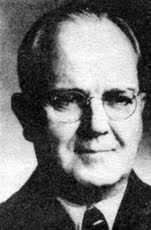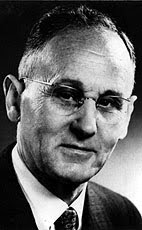Members of the Canadian Senate have been granted free mail privileges as have their fellow parliamentarians in the House of Commons. This post deals with mail from Senators during the 1952 to 1988 period of Queen Elizabeth's reign.

The Senate is called the "Red Chamber" because it is decorated in red, a traditional colour of royalty.
History of the Canadian Senate
Canada's two Houses of Parliament, the Senate and the House of Commons, were patterned after those of Britain, with two exceptions : Canada's upper chamber could not be occupied by hereditary peers, but rather would house persons of diverse experience summoned by the Governor General on the recommendation of the Prime Minister; and secondly, the principal geographic regions of Canada would be represented equally. Confederation would not have taken place at all if there had not been agreement on the Senate because, with the House of Commons membership based on representation by population, both Quebec and the Maritime provinces made it clear that they would not enter into the union without a Senate.
In the Commonwealth tradition, the Senate would primarily play a revising role, although its power was that of absolute veto. In being able to amend, postpone and veto legislation, the Senate was constitutionally granted the power needed to make it effective. Yet, due to its appointed nature and in the shadow of public criticism, the Senate has often refrained from exercising this power. The Senate has fulfilled other very important functions that were not anticipated at the time of Confederation. It has assumed investigative, deliberative and political duties to the benefit of the country.
Free Mail
 Letters and other mailable matter, except air mail and parcel post, addressed to or by any Member of the Senate while at Ottawa, during any session of Parliament, or during the ten days immediately preceding or following a session of Parliament could pass free of postage provided these letters and other matter were posted at or addressed to the Senate and not to the private residence in Ottawa of the member. The free mail regulations were amended on July 1,1971, permitting mail to be sent free of postage, from any place in Canada.
Letters and other mailable matter, except air mail and parcel post, addressed to or by any Member of the Senate while at Ottawa, during any session of Parliament, or during the ten days immediately preceding or following a session of Parliament could pass free of postage provided these letters and other matter were posted at or addressed to the Senate and not to the private residence in Ottawa of the member. The free mail regulations were amended on July 1,1971, permitting mail to be sent free of postage, from any place in Canada.
Franking
 Letters from Senators were required to be franked or certified to pass free in accordance with the regulations. The personally signed or handstamp signature of the Senator allowed mail to be sent free of postage.
Letters from Senators were required to be franked or certified to pass free in accordance with the regulations. The personally signed or handstamp signature of the Senator allowed mail to be sent free of postage.Cabinet Ministers
Canada’s Cabinet – by constitutional convention – is the body of advisors that sets the federal government’s policies and priorities for the country. Together they act in the name of the Queen’s Privy Council for Canada.
The Governor General appoints the members of Cabinet on the advice of the Prime Minister. Almost all of Cabinet is selected from the House of Commons. From time to time, a Senator may be included, for example, to ensure all parts of the country are represented.
21st Parliament : September 15 1949 - June 13, 1953Senator James Angus MacKinnon (Alberta)


Senator MacKinnon was appointed by Louis St. Laurent in 1949. He had been the MP for the Edmonton West riding from 1935 to 1949 and had served in the cabinet. Senator MacKinnon was appointed to the Privy Council by William Lyon Mackenzie King on January 23, 1939.

Senator MacKinnon correspondence to Calgary, July 2, 1952
Senator John Caswell Davis (Manitoba)


Senator Davis was a member of the Senate from 1949 to 1953.

Christmas card sent by Senator Davis to Winnipeg, December 15, 1952

Senator Gordon B. Isnnor (Nova Scotia)


Senator Isnor sat in the Senate from 1950 to 1973

Correspondence from Senator Isnor to Roche's Point, Ontario, February 24, 1953
(Roche's Point receiver February 25, 1953
22nd Parliament : November 12 1953 - April 12, 1957
William Ross Macdonald (Ontario) : Senator and Cabinet Minister


William Ross Macdonald was appointed to the Senate in 1953 and served in the Cabinet from 1953 to 1957, and from 1963 to 1964. He was also the Leader of the Government in the Senate (1953-57; 1963-64) and Leader of the Opposition in the Senate (1957-63). Macdonald had earlier served in the House of Commons from 1935 to 1953.

Senator Macdonald was the Solicitor General of Canada when the letter below was sent:

Senator Macdonald correspondence to Brantford, July 4, 1956

Senate "Free" date stamp
Senator Thomas Reid, British Columbia


Senator Reid was appointed to the Senate by Louis St. Laurent in 1949 and resigned in 1967. Senator Reid had been the Liberal Member for New Westminster,B.C., from 1930 to 1949

Senator Reid correspondence to New Westminster, March 11, 1957
24th Parliament : May 12 1958 - April 19 1962
Senator Charles Lawrence Bishop, Nova Scotia


Senator Bishop was appointed to the Senate in 1945 by William Lyon Mackenzie King and served until 1966.

Senator Bishop correspondence to Montreal, January 1, 1959
28th Parliament : September 9 1968 - September 1 1972
Senator Paul Martin, Ontario
 Paul Martin was appointed Leader of the Government by Pierre Trudeau in 1968 and served in the Senate until 1974. Senator Martin had been the MP for Essex-West (Ontario) from 1936 to 1968. Senator Martin's son, Paul Martin, Jr., became Canada's 21st Prime Minister holding that post from 2003 to 2006.
Paul Martin was appointed Leader of the Government by Pierre Trudeau in 1968 and served in the Senate until 1974. Senator Martin had been the MP for Essex-West (Ontario) from 1936 to 1968. Senator Martin's son, Paul Martin, Jr., became Canada's 21st Prime Minister holding that post from 2003 to 2006.


Sen. Paul Martin correspondence to Windsor, September 5, 1968

Written shortly before the start of the 28th Parliament and Paul Martin's new role in the Senate.
Senator Joseph Albert Sullivan, Ontario


Senator Sullivan was appointed to the Senate by John Diefenbaker and served from 1957 to 1985.

Senator Sullivan correspondence to Scarborough, December 9, 1970
Senator Earl Wallace Urquart (Nova Scotia)
(Photograph not available)

Handstamp on the back of the envelope
Senator Urquart served from 1966 to 1971. Prior to his appointment by Lester Pearson, Senator Urquart was the President of the Liberal Party of Canada.

Embossed Senate crest on back of envelope

Ottawa to Arichat, Nova Scotia, December 11, 1968
Letter paid with 5 cents stamp
29th Parliament: January 4 1973 - May 9 1974
Senator Donald Smith (Nova Scotia)


Donald Smith sat in the Senate from 1955 to 1980. Senator Smith was appointed by Louis St. Laurent.

Senator Smith correspondence to Liverpool, N.S., March 22, 1974
30th Parliament : September 24, 1974 - March 26, 1979
Senator James Dugan (Newfoundland and Labrador)


"J.D.G S."
Senator Dugan was in the Senate from 1966 to 1978.

Senator Dugan correspondence to Member of Parliament Michael Forrestal, House of Commons, December 13, 1977
The letter was cancelled at the House of Commons Post office
 Michael Forrestal, the addressee,
Michael Forrestal, the addressee,was a Nova Scotia M.P. from 1965 to 1988.
He was appointed to the Senate in 1990 by
Brian Mulroney and died in office in 2006.
Senator Raymond Perrault (British Columbia)


Senator Perrault was a member of the Senate from 1973 to 2001. Senator Perrault served as Leader of the Government in the Senate:


Senator Perrault correspondence from the Senate to North Vancouver, July 4, 1977

Senator Perrault correspondence mailed from Vancouver to West Vancouver, May 30, 1977

33rd Parliament : November 5, 1984 - October 11, 1988
Senator C. William Doody (Newfoundland and Labrador)


Senator Doody was appointed to the Senate by Joe Clark and was a member from 1979 to 2000.

Senator Doody correspondence to Montreal, February 23, 1984
Senator Jean Le Moyne (Quebec)


Senator Lemoyne, appointed by Pierre Trudeau, was a member of the Senate from 1982 to 1988.

Senator Le Moyne correspondence to Ottawa, March 3, 1986


Senator Perrault was a member of the Senate from 1973 to 2001. Senator Perrault served as Leader of the Government in the Senate:


Senator Perrault correspondence from the Senate to North Vancouver, July 4, 1977

Senator Perrault correspondence mailed from Vancouver to West Vancouver, May 30, 1977

33rd Parliament : November 5, 1984 - October 11, 1988
Senator C. William Doody (Newfoundland and Labrador)


Senator Doody was appointed to the Senate by Joe Clark and was a member from 1979 to 2000.

Senator Doody correspondence to Montreal, February 23, 1984
Senator Jean Le Moyne (Quebec)


Senator Lemoyne, appointed by Pierre Trudeau, was a member of the Senate from 1982 to 1988.

Senator Le Moyne correspondence to Ottawa, March 3, 1986
